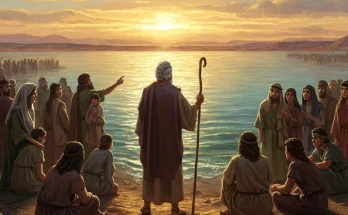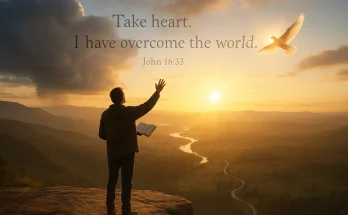What will happen when every person stands before God’s throne to give an account of their life? The White Throne Judgment, described in Revelation 20:11-15, is one of the most sobering events in biblical prophecy. It is the moment when God delivers His final judgment, deciding the eternal fate of every soul.
For centuries, scholars and believers have studied this passage, seeking to understand its meaning and significance. Some interpret it as a future event at the end of Christ’s millennial reign, while others see it as a symbolic or historical judgment. Regardless of the perspective, one thing remains clear—this moment marks the ultimate separation between life and death, between eternity with God and the lake of fire.
In this study, we’ll explore what the White Throne Judgment is, who will be judged, and what the Bible says about it. We’ll also compare two major interpretations—dispensationalism and partial preterism—to help us see how different theological perspectives shape our understanding. Whether you’re new to eschatology or looking for a clearer explanation, this guide will provide a solid foundation.
Let’s dive into Scripture and uncover the truth about God’s final judgment.
What Is the White Throne Judgment?
The White Throne Judgment is God’s final judgment, where every person stands before Him to be judged according to their deeds. Revelation 20:11-15 describes this scene with powerful imagery—a great white throne, the dead standing before God, and books opened to reveal their works. Ultimately, those whose names are not found in the Book of Life are cast into the lake of fire.
For dispensationalists, this judgment happens after Christ’s millennial reign, at the very end of human history. They believe it is a distinct event, separate from other judgments, and applies only to the unsaved dead from all time. Those who rejected Christ face eternal separation from God. In contrast, partial preterists see the White Throne Judgment as more symbolic or even as an event tied to historical judgments, like the destruction of Jerusalem in A.D. 70. They argue that it represents the culmination of God’s justice, not necessarily a single future event.
Regardless of interpretation, the White Throne Judgment underscores an essential truth—God is just, and everyone will answer to Him. This moment highlights the importance of salvation through Christ, as only those written in the Book of Life will inherit eternal life. Understanding this judgment helps us grasp the seriousness of eternity and the significance of God’s righteousness. Whether seen as a future event or a fulfilled prophecy, it calls us to live with eternal perspective.
The Setting of the White Throne Judgment
The White Throne Judgment unfolds in a breathtaking and solemn scene described in Revelation 20:11-12. John sees a great white throne, symbolizing God’s absolute authority, purity, and justice. The throne is not just large—it is magnificent, radiating divine power. This moment is unlike any earthly court; there is no jury, only the righteous Judge who knows all.
As John watches, the earth and sky flee from God’s presence, emphasizing His supreme power. Nothing can stand before Him except those who must be judged. Before the white throne, the dead, both great and small, stand in judgment. No one escapes this moment—kings and paupers, rich and poor, famous and unknown. Regardless of their earthly status, they are now equal before God.
Books are opened, revealing everything they have done. Their lives are recorded, and their deeds are exposed. But another book—the Book of Life—determines their eternal destiny. Those whose names are not found in it face the ultimate consequence.
This setting reminds us that God’s judgment is inescapable. Whether powerful or insignificant in this life, every person will stand before Him. The White Throne Judgment is the final reckoning, where righteousness prevails, and God’s justice is fully revealed. Understanding this scene helps us recognize the urgency of salvation and the reality of eternity.
The Books of Judgment and the Book of Life
During the White Throne Judgment, Revelation 20:12 tells us that books are opened, revealing everything people have done. These books play a crucial role in God’s final judgment. But there is also another book—the Book of Life—which determines who will inherit eternal life.
The Books That Record Deeds
The first set of books contains a record of every person’s works, both good and bad. God judges the unrighteous dead according to their deeds. Nothing is hidden—every thought, action, and decision is accounted for. While some may have done good works, their deeds alone cannot save them. Instead, these books demonstrate God’s justice, showing that no one can stand before Him without Christ’s righteousness.
The Book of Life
Unlike the books of deeds, the Book of Life records the names of those who belong to Christ. Those written in this book receive eternal life, not because of their works, but because of God’s grace. Salvation is not earned—it is a gift through faith in Jesus.
Judgment of the Righteous and Unrighteous
The righteous—those in Christ—are not judged for condemnation but for rewards (2 Corinthians 5:10). Their names are in the Book of Life, securing their place in eternity. The unrighteous, however, face judgment based on their deeds alone. Without salvation in Christ, their works are insufficient, and they are cast into the lake of fire.
Works vs. Grace: Clearing Up Misunderstandings
Many believe good deeds will get them into heaven. However, the White Throne Judgment shows that salvation comes only through faith in Christ. Good works matter, but they do not replace God’s grace. Only those whose names are in the Book of Life will escape judgment and enter eternal life.
The Final Verdict: The Lake of Fire
The White Throne Judgment leads to the final, irreversible verdict—eternal separation from God in the lake of fire. Revelation 20:14-15 describes this terrifying fate, calling it the second death. While physical death ends earthly life, the second death is far worse. It is complete and eternal separation from God, with no hope of redemption.
The lake of fire represents God’s final judgment against sin. It is not just symbolic; it signifies real, eternal punishment. Unlike earthly suffering, this judgment is not temporary. There is no second chance, no escape, and no reversal. Those thrown into it face eternal separation from God’s presence, justice, and mercy.
So, who ends up in the lake of fire? According to Scripture, everyone not found in the Book of Life is cast into it. This includes those who rejected Christ, the wicked from all ages, and even Satan himself (Revelation 20:10). No matter how many good works someone has done, if their name is not written in the Book of Life, they face this final judgment.
This truth should stir our hearts. The White Throne Judgment is not about unfair punishment—it is about perfect justice. God has given every person the chance to receive salvation through Christ. Those who reject Him choose eternal separation. This reality should drive us to share the gospel and live with eternity in mind.
Dispensational View of the White Throne Judgment
Dispensational eschatology is a framework that divides history into different dispensations, or periods, where God interacts with humanity in distinct ways. This view emphasizes a literal interpretation of prophecy and sees God’s plan unfolding through specific, prophetic events. The White Throne Judgment is the final judgment in this timeline, marking the end of human history and the beginning of eternity.
The White Throne Judgment in the Dispensational Timeline
Dispensationalists follow a structured end-times timeline:
- Church Age – The current period where the gospel spreads.
- Rapture – Believers are taken to heaven before the Tribulation.
- Tribulation – A seven-year period of God’s wrath on earth.
- Second Coming – Christ returns to defeat evil and establish His kingdom.
- Millennial Reign – A literal 1,000-year reign of Christ on earth.
- White Throne Judgment – The final judgment of the unsaved dead.
At the White Throne Judgment, the dead are resurrected and stand before God. These are unbelievers from all ages—those who rejected Christ. They are judged based on their works, but because their names are not in the Book of Life, they face eternal separation in the lake of fire.
Bema Seat vs. White Throne Judgment
Dispensationalists distinguish between two major judgments. The Bema Seat Judgment happens after the rapture, where believers receive rewards based on their faithfulness (2 Corinthians 5:10). This is not about salvation but about rewards in eternity. The White Throne Judgment, however, is for the unrighteous dead and determines eternal punishment.
Understanding this view helps us see the seriousness of rejecting Christ. The White Throne Judgment is not for believers, but it reminds us why salvation through Jesus is urgent. Eternity is real, and God’s justice is final.
Partial Preterist View of the White Throne Judgment
Partial preterism is a view of biblical prophecy that sees many end-times events as already fulfilled, rather than waiting for a future fulfillment. Unlike full preterists, who believe all prophecy is complete, partial preterists hold that some prophecies—such as the Second Coming—are still future. However, they interpret much of Revelation, including the White Throne Judgment, as events that have already occurred or are ongoing.
The White Throne Judgment as a Past or Ongoing Event
From a partial preterist perspective, the White Throne Judgment is not a one-time, future event. Instead, it represents God’s ongoing judgment throughout history, culminating in significant historical events. Many believe it began with the destruction of Jerusalem in A.D. 70, when God judged Israel for rejecting Christ. This moment marked the end of the Old Covenant system, making way for the full establishment of the New Covenant.
Rather than viewing this judgment as a single moment at the end of time, partial preterists see it as an unfolding reality. People are judged throughout history, and God continues to separate the righteous from the unrighteous. Some believe the final judgment will still occur at the very end, but they emphasize that much of Revelation’s prophecy is already fulfilled.
The Lake of Fire: Spiritual Separation or Literal Punishment?
Partial preterists often see the lake of fire differently than dispensationalists. Instead of a literal place of eternal torment, they interpret it as spiritual separation from God. The second death represents complete exclusion from God’s presence, rather than endless suffering in a physical lake of fire. This view aligns with the idea that judgment is more about covenantal transition than a final, catastrophic event.
Understanding this perspective helps us see how different theological lenses shape our view of prophecy. Whether we see the White Throne Judgment as past, present, or future, one truth remains—God’s justice prevails, and our response to Christ determines our eternity.
Key Differences and Similarities Between the Two Views
Key Differences
Dispensationalists and partial preterists interpret the White Throne Judgment in very different ways. Dispensationalists see it as a future, literal event that happens after Christ’s millennial reign. It is the final judgment where the unsaved dead are resurrected, judged, and cast into the lake of fire. This view places the White Throne Judgment at the very end of history, emphasizing God’s ultimate justice.
In contrast, partial preterists believe the White Throne Judgment is not a single future event. Instead, they interpret it as a symbolic or historical fulfillment, often tied to the destruction of Jerusalem in A.D. 70. Rather than a literal courtroom scene in the future, they see it as an ongoing judgment throughout history. Many also view the lake of fire as spiritual separation from God, rather than a literal place of torment.
Key Similarities
Despite their differences, both views agree on important theological truths. First, both acknowledge that God’s final judgment is real, whether it has already begun or will come later. They also affirm that everyone is accountable before God, and no one can escape His justice.
Most importantly, both dispensationalists and partial preterists emphasize that salvation comes only through Christ. Regardless of when or how the White Throne Judgment occurs, those who trust in Jesus are saved. This shared belief reminds us that, above all, our hope is found in Him.
Final Thoughts: Why This Matters Today
The White Throne Judgment is a powerful reminder of God’s justice and the reality of eternity. Whether we see it as a future event or an ongoing fulfillment, one truth remains—every person will stand before God. This judgment shows that righteousness matters and that our choices have eternal consequences.
Understanding biblical prophecy helps shape our perspective on God’s plan. Different views challenge us to study Scripture more deeply and grow in our faith. While details may vary, the core message is the same—salvation is found in Christ alone.
This truth should encourage us, not frighten us. Those who trust in Jesus have their names in the Book of Life and need not fear judgment. Instead, we should live with purpose, sharing the gospel and preparing for eternity. Let’s keep seeking truth, growing in faith, and drawing closer to Christ every day.
Frequently Asked Questions (FAQ) About the White Throne Judgment
1. What is the White Throne Judgment? The White Throne Judgment is God’s final judgment, described in Revelation 20:11-15. It is when all the unsaved dead stand before God to be judged based on their deeds. Those not found in the Book of Life are cast into the lake of fire.
2. Who will be judged at the White Throne Judgment? This judgment is for unbelievers from all ages—those who rejected Christ. Believers, whose names are in the Book of Life, are not judged for condemnation. Instead, they are rewarded at the Bema Seat Judgment (2 Corinthians 5:10).
3. Is the White Throne Judgment the same as the Judgment Seat of Christ? No, these are different judgments. The Judgment Seat of Christ (Bema Seat) is for believers and focuses on rewards, not punishment. The White Throne Judgment is for the unsaved dead, determining their eternal fate.
4. When does the White Throne Judgment happen? Dispensationalists believe it occurs after Christ’s millennial reign, at the very end of history. Partial preterists see it as a symbolic or historical judgment, not a future event.
5. How can someone avoid the White Throne Judgment? The only way to escape this judgment is through faith in Jesus Christ. Those whose names are written in the Book of Life receive eternal life with God.



